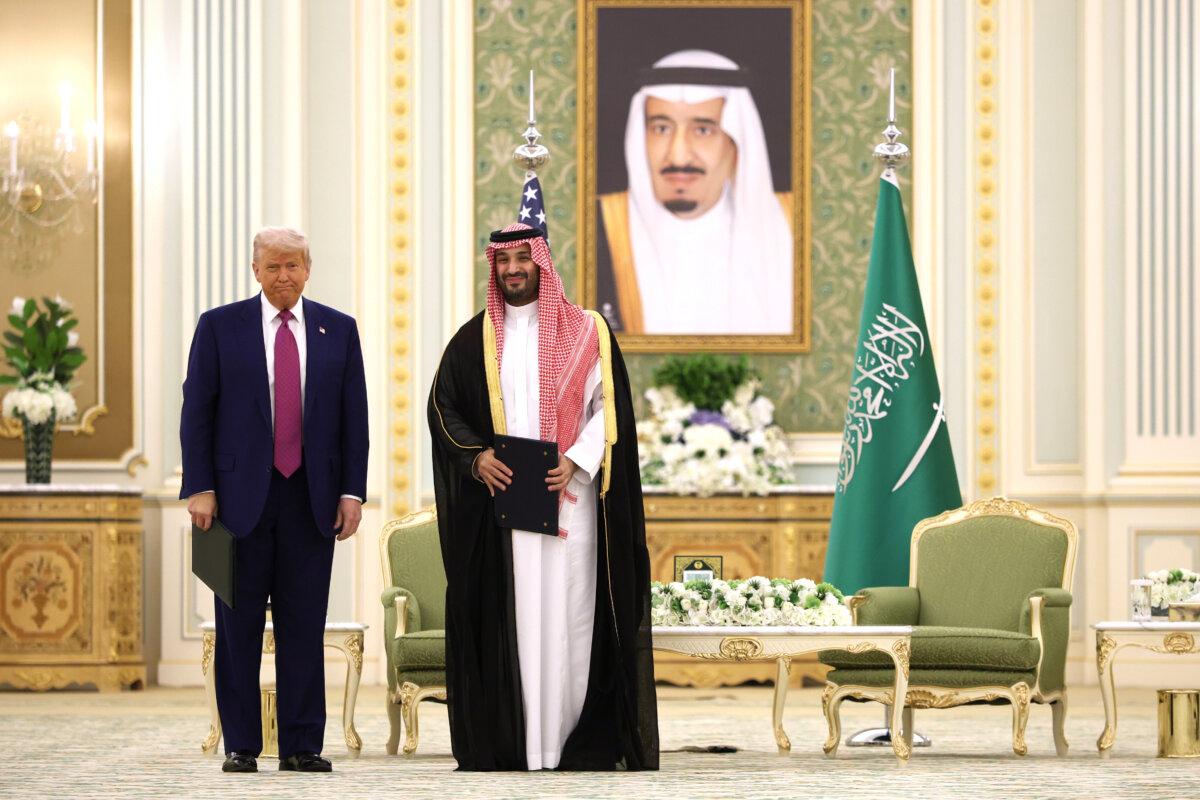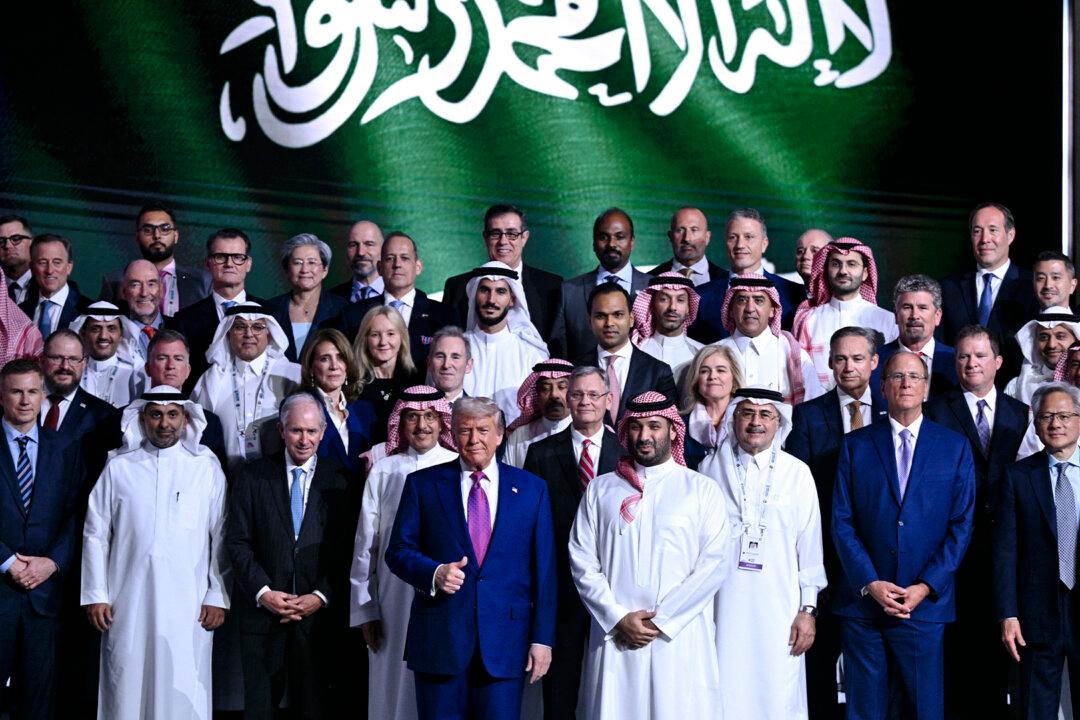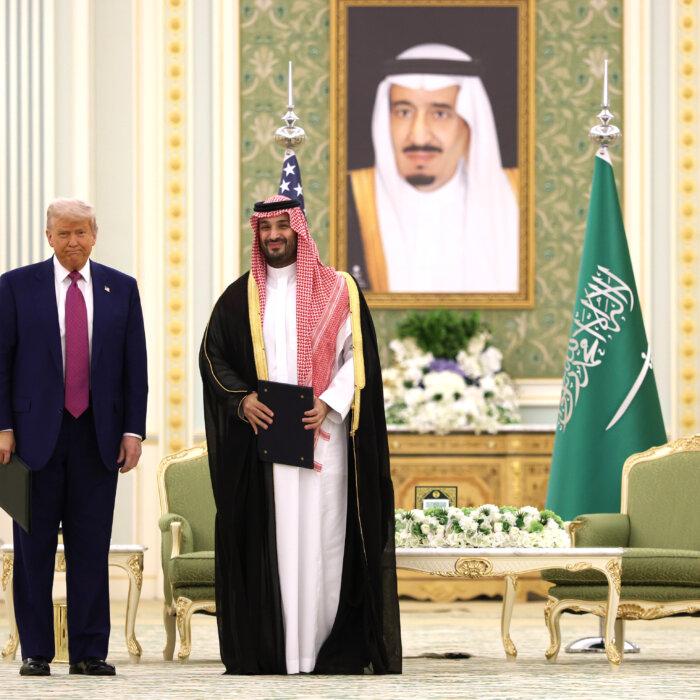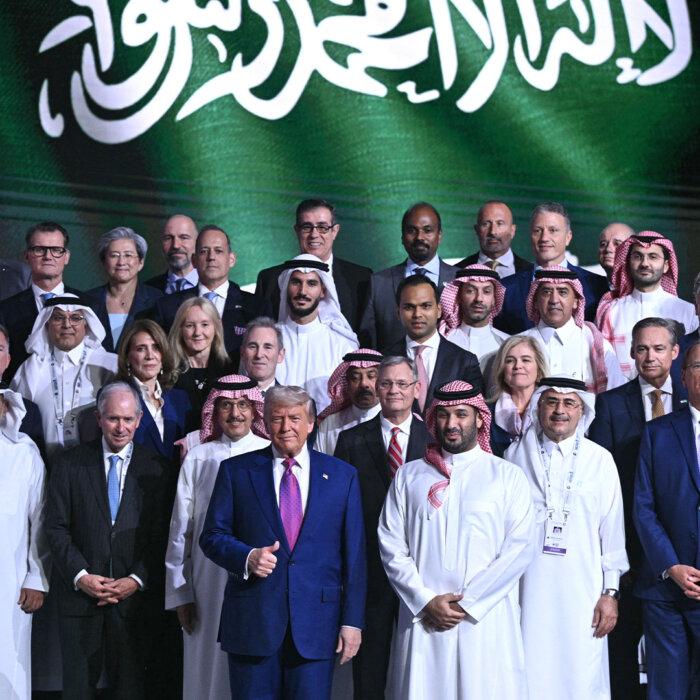RIYADH, Saudi Arabia—When President Donald Trump arrived in the Saudi capital on May 13, one of his first actions was to address the Gulf’s business elite, promoting the United States as a prime destination for investment amid a new era shaped by his “America First” agenda.
Trump made it clear that his three-day tour of the Middle East, with stops in Saudi Arabia, Qatar, and the United Arab Emirates (UAE), would be all about making deals.
Speaking at the Saudi–U.S. Investment Forum at the King Abdul Aziz International Conference Center, Trump commended the kingdom’s transformation since his previous visit eight years ago.
He began his speech by saying, “I’ve come this afternoon to talk about the bright future of the Middle East, but first, let me begin by sharing the abundance of good news from a place called America.”
Trump talked about inheriting a border crisis and bringing illegal crossings down to historic lows within weeks, declining inflation, and nearly half a million new jobs that have been created since he took office. He praised trade deals with the UK and China as major wins, noting that investment in the United States is up by 22 percent in the first quarter and that Congress is close to passing the largest tax and regulatory cuts in U.S. history, underscoring his message that now is the right moment to invest in the United States.
Before his prepared address, Trump took the stage in a way reminiscent of his 2024 election campaign, with “God Bless the USA” playing. He then spoke for more than an hour before wrapping up with “Y.M.C.A.,” the song he frequently used to close his campaign rallies.
“We are rocking,” Trump told the forum.
“The United States is the hottest country, with the exception of your country, I have to say.”
As in his first term, Trump chose Saudi Arabia for his first state visit, signaling the strategic importance of ties with the oil-rich nation.
Seeking to draw multibillion-dollar investments into the United States, Trump turned to the Gulf states, home to some of the world’s largest sovereign wealth funds, as ideal partners to advance his economic agenda.
During the meetings in Riyadh, the kingdom has committed $600 billion in investments across various U.S. sectors, including artificial intelligence (AI) data centers, aerospace, energy infrastructure, defense, and health care.
“We’ve launched the Golden Age,” Trump said.
“It’s the golden age. We see it, see it with all that money—trillions and trillions of dollars pouring in.
“We will be together. We will succeed together.”

Investment and Arms Agreements
Before his remarks at the investment forum, Trump and Saudi Crown Prince Mohammed bin Salman signed a strategic economic partnership agreement, which includes several memoranda of understanding on energy, mineral resources, and cooperation in defense, justice, space, and infectious diseases.As part of the agreement, Riyadh officials plan to allocate capital to specialized sectors, including a $5 billion Energy Investment Fund and a $5 billion New Era Aerospace and Defense Technology Fund.
The United States will export billions of dollars worth of gas turbines, energy solutions, and services. Saudi Arabia is also set to purchase approximately $142 billion in advanced warfighting equipment and services from more than a dozen U.S. defense companies. The White House described the deal as the “largest defense sales agreement in history.”
After taking office, Trump made it clear that his visits abroad would prioritize countries that commit to substantial investment in the United States.
The UAE earlier committed to a $1.4 trillion investment framework in the United States over the next decade, targeting AI and semiconductor infrastructure, the energy sector, and manufacturing. The UAE will be Trump’s third stop during his Middle East tour.
Trump touched down in Saudi Arabia with a strong delegation. Accompanying the president were several top officials and advisers, including Secretary of State Marco Rubio, Defense Secretary Pete Hegseth, Treasury Secretary Scott Bessent, Commerce Secretary Howard Lutnick, Secretary of Energy Chris Wright, and senior aides Susie Wiles and Stephen Miller.
The crown prince greeted Trump upon his arrival at the airport with a ceremonious welcome reminiscent of the warm reception Trump received during his first term.
During his bilateral meeting with the Saudi crown prince in Riyadh, Trump joked that his $600 billion investment commitment could be a trillion dollars.
“I really believe we like each other a lot,” Trump said.
In Riyadh, lavender carpets were rolled out for Trump at every stop. The color, chosen by Saudi Arabia as a national symbol, is inspired by the lavender flowers that blanket the kingdom’s deserts each spring.
After his arrival, Trump attended a high-level lunch at the Saudi Royal Court with bin Salman. Dozens of U.S. executives also participated in the lunch meeting, underscoring the economic focus of the visit and the potential business deals being negotiated.
Prominent guests included Tesla and SpaceX CEO Elon Musk, Blackstone CEO Stephen Schwarzman, BlackRock CEO Larry Fink, Boeing President and CEO Kelly Ortberg, and OpenAI CEO Sam Altman.
Regional Security
During his address to the forum, Trump praised the transformation of Riyadh under the leadership of King Salman and the crown prince, calling it “truly extraordinary.”Saudi Arabia and other Gulf nations have shifted from oil-dependent economies to diversified industries, including high-tech, according to Trump.
The president said that this transition would lead to a future in which the region is “defined by commerce, not chaos” and “exports technology, not terrorism.”
“After so many decades of conflict, finally it is within our grasp to reach the future that generations before us could only dream about—a land of peace, safety, harmony, opportunity, innovation, and achievement right here in the Middle East,” he said.
In a move that garnered sustained applause, Trump confirmed that he would order the cessation of sanctions against Syria. He said he plans to greet Syrian President Ahmed al-Shara—who led the ousting of former leader Bashar al-Assad in December 2024—on May 13.
The United States has imposed punishing restrictions on Syria in the wake of a civil war that began in 2011 there. Past presidents have attempted to pressure the government to halt violence against citizens and advocate for political reforms.
The new Syrian leader, Ahmed al-Sharaa, who has past links to terrorist organizations, has vowed to be a moderate leader and pursue diplomatic ties with Western countries. Since obtaining power, al-Sharaa has adopted several reforms that advance free speech, freedom of the press, and women’s political and economic rights.
He recently met with French President Emmanuel Macron over unwinding sanctions on Damascus.








